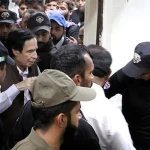ISLAMABAD: The Supreme Court of Pakistan on Monday, after considerable consideration, overturned the lifetime disqualification of legislators and recalled its previous ruling prohibiting politicians from ever standing for office. This gave political heavyweights who were planning to run for office on February 8 more optimism.
The Supreme Court overturned its historic ruling in the Samiullah Baloch case and ruled that no one can be permanently prohibited from participating in elections if they are disqualified under Article 62 (1)(f).
The case hearings were broadcast live on the highest court and were presided over by Chief Justice Qazi Faez Isa and included seven members of the larger bench: Justice Syed Mansoor Ali Shah, Justice Yahya Afridi, Justice Aminuddin Khan, Justice Jamal Khan Mandokhail, Justice Muhammad Ali Mazhar, and Justice Musarrat Hilali.
With a 6-1 majority, the bench rendered its decision, with Justice Yahya Afridi standing in opposition to his fellow justices and supporting the earlier ruling from the supreme court.
The changes to the Elections Act 2017 that limited a politician’s disqualification period to five years rather than a lifetime—against the Supreme Court’s ruling that disqualification under Article 62(1)(f) was “permanent”—created a legal quandary.
Nawaz Sharif, the leader of the Pakistan Muslim League-Nawaz (PML-N), and Jahangir Tareen, the leader of the Istehkam-e-Pakistan Party (IPP), are now able to run for office after being permanently disqualified according to a recent ruling.
The chief justice stated that it was “necessary” to release the order as soon as possible once the election date was announced, along with the reserved verdict.
The chief judge stated during the prior hearing that it was “against Islam” to disqualify someone from life in parliament, citing a Surah Sajdah phrase that states that although people are not evil, their activities are.
The order “came at the right time,” according to Pakistan Institute of Legislative Development and Transparency (Pildat) President Ahmed Bilal Mehboob and senior anchor Shahzeb Khanzada in an interview with Geo News.
Since Article 62(1)(f) of the Constitution does not expressly state a period for disqualification, the SC observed in its written ruling that it is not a self-executive provision.
“The Fundamental Right to a fair trial and due process guaranteed by Article 10A of the Constitution is not met by any law that specifies the procedure, process, identification of the court of law for making the declaration mentioned in Article 62(1)(f) of the Constitution and the duration of such a declaration, for the purpose of disqualification thereunder.”
According to the order, reading Article 62(1)(f) of the Constitution to impose a lifetime disqualification upon an individual through an implied declaration of a civil jurisdiction court while resolving certain civil rights and obligations of the parties is beyond the purview of the said Article and is tantamount to reading the entire document into it.
The aforementioned order, which abridges citizens’ fundamental right to run for office and vote for the candidate of their choice as guaranteed by the Constitution, in the absence of reasonable limitations imposed by law, is another example of how the Constitution should be read harmoniously.
The order stated that Article 62(1)(f) of the Constitution “stands on a similar footing as Article 62(1)(d), (e), and (g), and serves as a guideline for the voters in exercising their right to vote until a law is enacted to make its provisions executory.”






